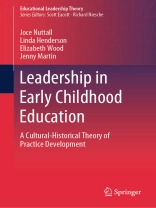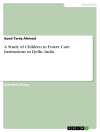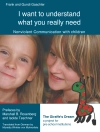The book presents a conceptual framework for understanding leadership for effective educator learning in early childhood settings. The book describes how leaders can move centre practices from crisis to stabilization. It argues that a core component of leaders’ work in early childhood settings is to construct and enact epistemological accounts of practice change. The book includes case examples that bring to life the contexts early childhood services and services leaders who par...
The book presents a conceptual framework for understanding leadership for effective educator learning in early childhood settings. The book describes how leaders can move centre practices from crisis to stabilization. It argues that a core component of leaders’ work in early childhood settings is to construct and enact epistemological accounts of practice change. The book includes case examples that bring to life the contexts early childhood services and services leaders who participated in the research. The book also describes the application of cultural-historical activity theory to the development of practice in early childhood education. It describes how background theory, literature, and data can be synthesized to create new focal theory in education.
Readers will benefit from the theory that is presented, establishing a sound basis for testing in future research in schools as well as in early childhood education.
“Joce Nuttall and team are congratulated for their ground-breaking scholarly endeavour in designing, implementing, validating findings, and then writing a book that unambiguously connects theory-policy-practice in enacting leadership in early childhood settings. This book is ambitious, eloquent, and inspirational. The research was driven by a bold vision to build a new theorisation of early childhood leadership. The writing style of the book makes the complex clear and easy to digest, and thereby strengthening its readability and understanding. The comparative lens adopted in the study, underscores the neoliberal control of the working lives of early childhood leaders in both Australia and England. The use of case study narratives to explain various aspects including the study design and methodology, was refreshingly engaging. Notes of encouragement addressed to novice researchers such as those embarking on higher degree studies, also provide apt guidance about the messiness of conducting qualitative research. The book is infused with lots of examples demonstrating the transformative power of learning – especially when expertly scaffolded by the research team, and thereby increasing practitioner agency and quality improvement across the early childhood setting. If professional autonomy is the driver of reform and change, then we must find ways to nurture strong educational leaders who can think outside the box. Overall, Nuttall and team succeed in arousing learning-rich possibilities for reimagining early childhood leadership in theory and in practice, and thereby making a magnificent contribution to the scholarship of educational leadership.” Professor Manjula Waniganayake Ph D, Macquarie University, Sydney, Australia












